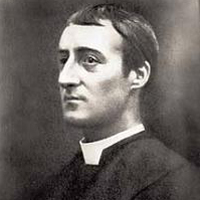Spring and Fall by Gerard Manley Hopkins: Summary and Analysis
Spring and Fall by Gerard Manley Hopkins is a modern poem about philosophical definition of human life. It is a dramatic meditative poem since it narrates an event, imagining a philosopher as a speaker in conversation to a girl name Margaret. We find character, dialogue, and setting and plot as well in the poem. The poem is about the reality of human existence that has been well introduced through its title 'Spring and Fall'.

Gerard M. Hopkins (1844-1889)
In the poem, the speaker addresses to a girl, Margaret, who is crying at the fall of tree leaves. As a philosopher, speaker asks Margaret not to grieve over goldengrove unleaving. The speaker believes that the young girl, Margaret equally cares for leaves like the things of man. In her innocence, with fresh thoughts, she worries for the falling leaves. Margaret as an innocent child, separation is a great loss for her. She doesn't know the meaning of death. A child is out of knowledge of death, end, destruction, and collapse. The speaker in the poem behaves as a philosopher. He is trying to persuade Margaret not to weep, not to mourn, and not to spare sigh, when goldengroove is unleaving. For the experienced person, "goldengrove unleaving" is a minor natural process. There is nothing to worry and lament over it. When the human heart grows older, so many pains come and go away. For a young heart, it is intolerable to tolerate separation and loss. The speaker of the poem has tried to read the mentality of a young child. Very plainly, he says that it is all because of Margaret's childhood. Still Margaret is not fully developed human being. She is left to cross many hurdles and obstacles in her life. Thus Margaret is as spring. As she grows, she will take a journey towards fall. Then, only she will realize the absolute truth of the human world and the meaning of fall.
Moving a step ahead, the speaker argues that as the heart grows older; such sorrows come and go away. Though the narrator's tone towards the child is tender and sympathetic, he does not try to comfort her. The philosophical argumentations are beyond the understanding of the young girl. The child is emotional and ignorant regarding this loss, whereas the speaker is poetical, philosophical, and generalizing something of a natural process which is really tough and vague to understand by an innocent girl. The speaker is matured, but his technique of addressing to the child is colder. He asks many questions to her, but when gets no result, then assumes answers and moves further. In real sense when the child grows she can take a journey towards fall or left to cross many hurdles and obstacles in her life then only she can realize the absolute truth of the human world. The speaker is unlike a teacher as he does not care for age and level of knowledge of the child. In the poem, we find the contrast between innocence and experienced. The speaker represents the experience, whereas the child represents the innocence. Margaret has fresh thoughts and such thoughts are indifferent to the idea of death and destruction. Similarly, the speaker represents fall and the child represents the spring.
Related Topics
God's Grandeur: Summary and Analysis
The Windhover: Summary and Analysis
Pied Beauty: Summary and Analysis
Gerard Manley Hopkins: Biography
 |
bachelorandmaster.com |